Solar Inverters: Ultimate guide to choosing the right one for your home
Solar panel inverters are the brains of any solar PV system, yet many people don’t fully understand their importance.
If you’re thinking about switching to solar energy, it’s important to understand the role of a solar inverter. Simply put, without a solar inverter, the energy your home solar panels generate can’t be used.
Many homeowners get excited at the thought of going solar but feel overwhelmed by all the technical details. This is especially the case when it comes to picking the right solar inverter. So, with all the different options out there, how do you make the right choice?
On this page, you’ll learn:
- What a solar inverter is and how it works within your solar energy system.
- Different types of solar inverters and how to choose the best one for your needs.
- Key factors to consider, including efficiency, cost, and compatibility with your existing setup.
- …and much more!
By the end of this in-depth learning post, you’ll have a solid understanding of solar inverters and be ready to feel confident in making the right decision for your solar energy system.
Let’s begin!
What is a solar inverter?
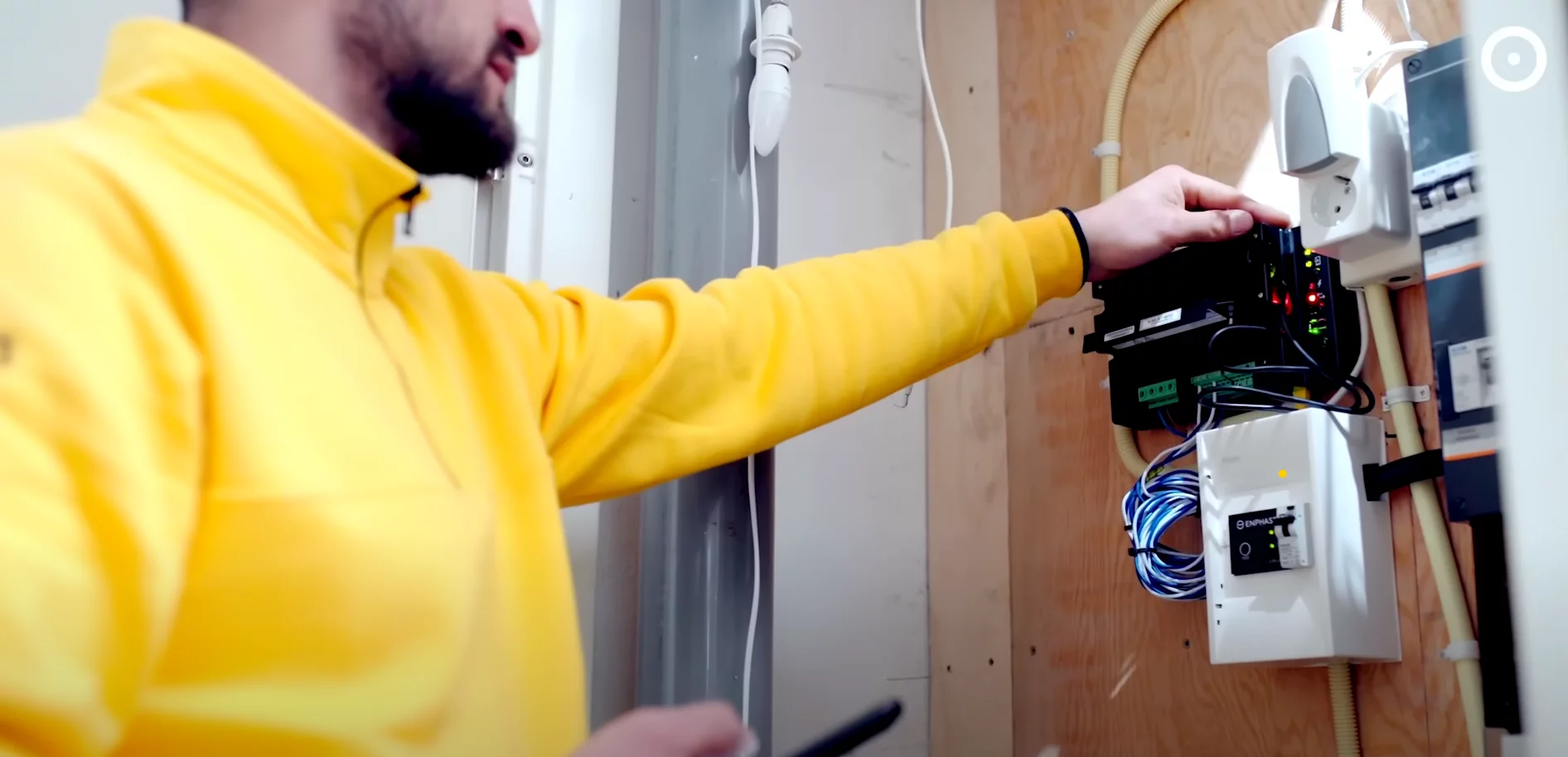
It takes the direct current (DC) electricity that’s produced by your solar panels and converts it into alternating current (AC) electricity, which is the type of power that most homes use. Without this conversion, the energy from your solar panels would be essentially worthless. It wouldn’t work with your household devices or be able to feed into the National Grid.
Key information:
- AC electricity is the standard for most of our everyday electrical needs because it’s more efficient for transmitting electricity over long distances.
- It can also be used to power everything from your lights and fridge to your heating system.
- This makes the solar inverter essential not just for using solar energy in your home, but also for potentially selling excess energy back to the grid, which can help offset your energy costs.
- A high-quality inverter does more than just convert electricity. It ensures that your solar panel system operates at its best, helping to maximise the amount of energy you generate.
- A grid tie inverter, in particular, plays a crucial role in synchronising with the utility grid and ensuring safety during power outages.
How does a solar inverter work?
As we mentioned earlier, the solar inverter is the brains of the operation in a solar panel system.
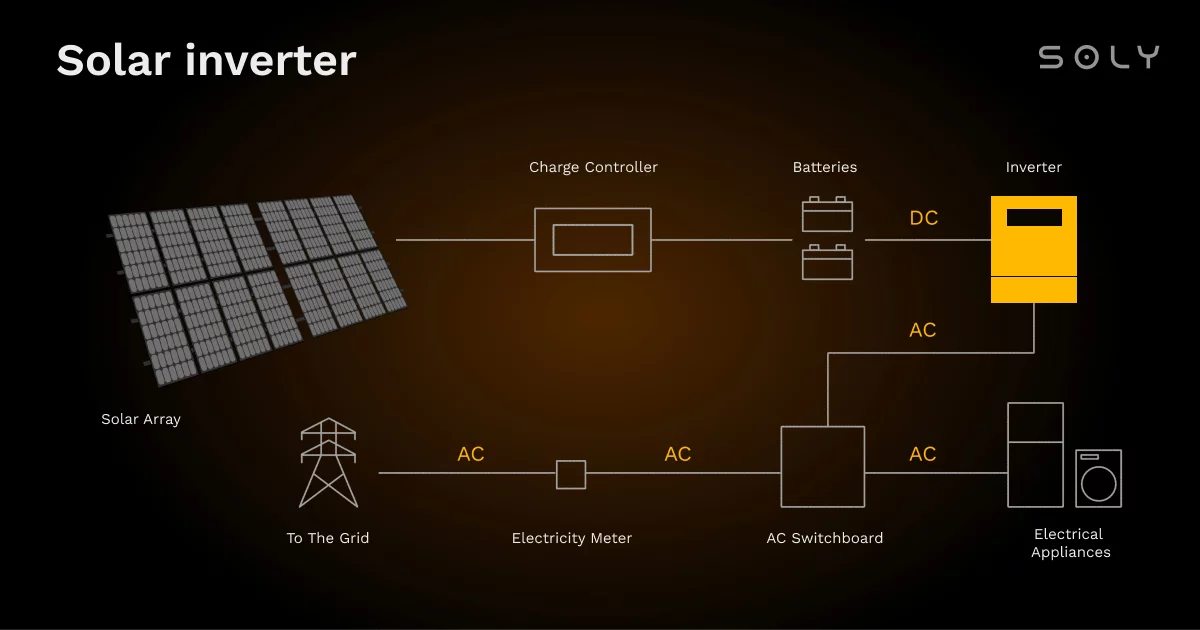
Here’s a breakdown of how that works:
- Your panels produce DC electricity which flows into the inverter. The inverter changes the DC into AC so you can use it within your home.
- The inverter finds the best way to get the most power out of your panels, even as sunlight changes throughout the day. Think of adjusting the volume on the TV to hear it better.
- Inside the inverter, there’s a part that adjusts the electricity to match what your home requires. It changes DC to AC in a flash switching the current back and forth. This makes the energy usable in your lights, appliances, and more.
- The inverter also keeps an eye on everything to make sure that electricity is being converted as efficiently as possible and has safety features to keep your home safe from electrical issues.
In doing all these things, the inverter makes certain that the solar energy you produce is safe, efficient, and at-the-ready to power your home.
The different types of solar panel inverters
There are four main types of solar inverters. They include string inverters, micro-inverters, and hybrid inverters.
Each type has its unique advantages and is suitable for different solar setups. Below, we’ll take a look at each in detail as well as their pros and cons.
String Inverters
String inverters are the most commonly used inverter in residential solar systems. Think of them as the main brain for a group of solar panels.
Multiple panels are connected in a series, or “string,” and all their power is sent to a single, central inverter. This converts the DC electricity from the panels into AC electricity for your home.
Pros
- ✅ Typically cheaper than other types of inverters.
- ✅ Proven technology that’s been around for a long time.
- ✅ Since there’s only one inverter, it’s easier to manage and less expensive to maintain.
Cons
- ❌ If one panel in the string is shaded or not working well, it can reduce the performance of all panels connected to the inverter.
- ❌ Usually you can only track the performance of the entire string, not individual panels.
Micro-Inverters
Microinverters are small devices that attach to each solar panel. Unlike string inverters, microinverters handle energy conversion directly from each panel.
This means each panel can work on its own, so your system will continue to perform well even if one panel isn’t getting much sunlight.
No matter what’s happening with the other panels in your system, the direct conversion from microinverters helps every panel perform at its best.
Microinverters are especially helpful if your panels are installed in a way where some might be in the shade at different times of the day or facing different directions. Because each panel works independently with its own microinverter, a shaded or less efficient panel won’t reduce the performance of the entire solar system.
So, micro-inverters optimise power output from individual solar panels, allowing for improved performance even in shaded conditions.
Additionally, microinverters tend to last a long time. For instance, brands like Enphase provide a 25-year guarantee. This means they’re built to last and work reliably for years to come. A Soly customer, Dave, tells tells the story of his experience with a Microinverter Solar System.
Pros
- ✅ Better performance
- ✅ Easy to monitor, so you can fix problems quickly
- ✅ Flexible installation, great for roofs with different angles or shading throughout the day
- ✅ Long lifespan, built to last many years
Cons
- ❌ More expensive at the start
Keep on reading: Difference between serial and parallel connection of solar modules
Hybrid Inverters
Hybrid inverters are versatile and combine the functions of a standard inverter and a battery inverter. They can convert DC to AC like regular inverters but they can also manage battery storage.
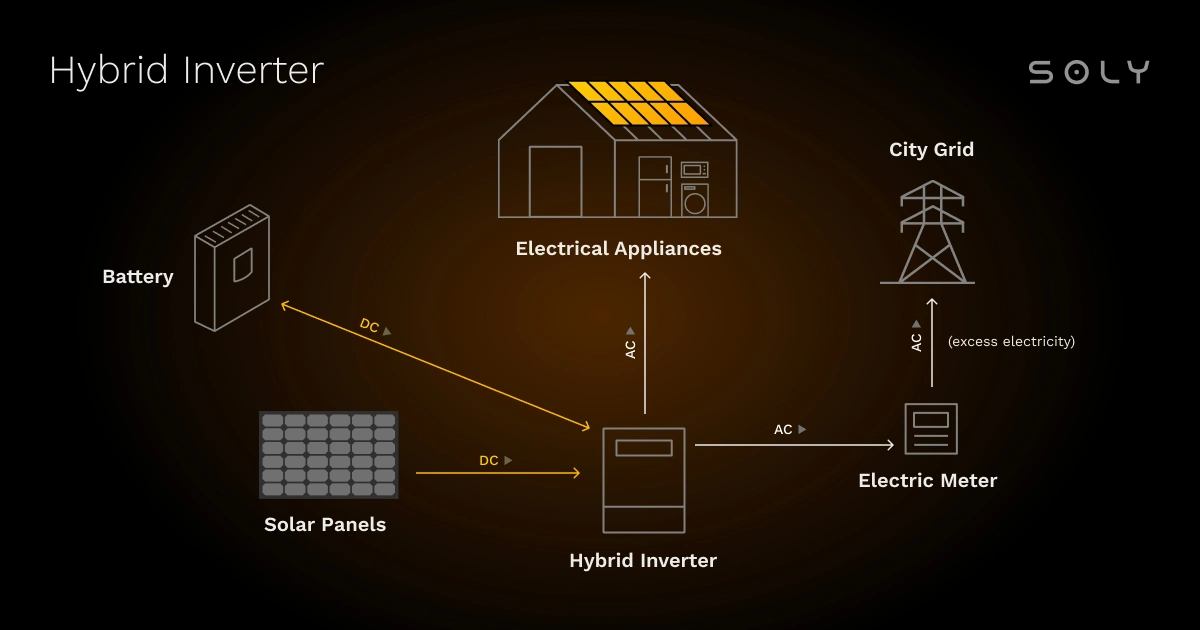
Pros
- ✅Smart energy management allowing you to store excess power or sell it back to the grid.
- ✅ Already set up for battery storage which can save you money if you choose to add a battery later on.
Cons
- ❌ Generally cost more than other inverter options like standard string inverters.
- ❌ More features mean a more complex system to operate.
What about power optimisers?
Power optimisers are not solar inverters but work alongside them as a complementary technology to enhance performance. Power optimisers are devices installed on each panel. These are a lot like microinverters. However, instead of converting DC to AC at each panel, power optimisers condition the DC power. This makes it more efficient. Then, it sends it to a (central) string inverter.
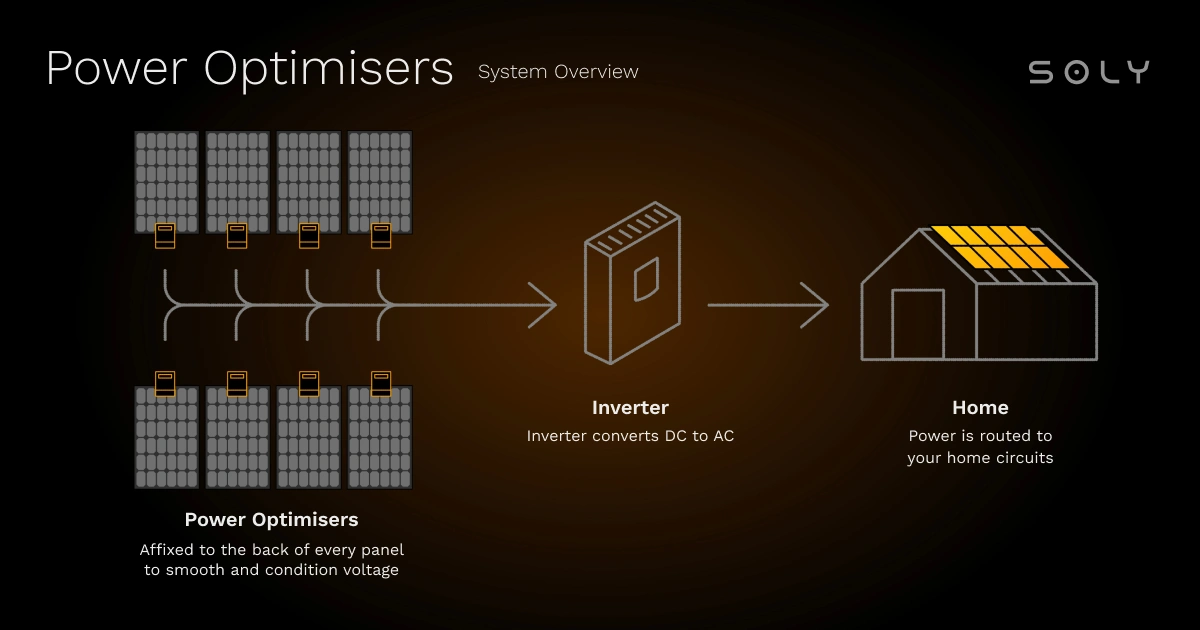
Maximum power point tracking (MPPT) technology optimises the energy harvested from photovoltaic panels by adjusting the load to maximise output under varying environmental conditions.
Pros
- ✅ Optimisers reduce the impact of shading or malfunction on individual panels, improving efficiency.
- ✅ Allows you to track performance of each panel individually.
Cons
- ❌ Still requires a central inverter, if the main inverter fails, the whole system goes down.
- ❌ More expensive than just having a string inverter.
Choosing the right solar inverter
There are a few things to keep in mind when looking for the right solar inverter for your home.
To get the most out of it, be sure to think about:
- how big your solar panel setup is,
- how much energy you need, and
- how much you’re willing to spend.
It’s also necessary to look at the type of inverter. Is it a string, microinverter, hybrid, or power optimiser?
Get an idea of just how efficient it is and whether the brand and inverter you’re interested in works well with your solar panels or not.
Bear in mind that a good solar installation company can give you expert advice on the best inverter for your needs. They can assist you with the many options out there, take your budget into consideration, and help you choose an inverter that’s the perfect fit for your needs and your home.
Factors to consider
#1: Solar inverter applications
Your solar inverter is your middleman. Solar inverters are used in different types of solar panel setups, including those for homes, businesses, and larger industrial sites.
In a home, a solar inverter changes the electricity generated by your solar panels into a type that can power your appliances, like your lights, fridge, and TV. This is a necessity for anyone looking to cut down on their energy bills and use more green energy.
For people who live off-grid, meaning they aren’t connected to the main electricity supply, solar inverters are also very helpful. These setups can work without storing energy, which means they convert the sun’s power directly into electricity that can be used immediately. This is great for remote areas or for people who want to be more independent in their energy use.
Solar inverters are also handy for portable solar panels. These panels can fold up and are easy to carry, making them perfect for camping or providing backup power during an emergency.
Additionally, some solar inverters can connect to several solar panels at once, which allows for bigger setups without needing more than one inverter.
#2: Solar inverter costs and savings
When we look at the various options for solar inverters (string, microinverters, hybrid, & power optimisers), each one can vary in price based on the type and size. The cost and savings you garner from the inverter you use will also depend on how big your solar panel system is.
Standard types of inverters cost between £500 and £1500.
Although that may seem like a lot upfront, it’s important to think about the money you can save over time. When you opt for just the right inverter, you can save on your energy bills. The amount you save will depend on the size of your system, how much sun your area gets, and the usual electricity use.
Over time, these savings can truly add up and cover the initial cost of the inverter, making solar energy a worthwhile investment.
Plus, using solar energy with a good inverter helps you lower your carbon footprint. This means you’re reducing the amount of harmful emissions released into the environment, which is a big win for the planet.
#3: Solar inverter efficiency and performance
As in real estate, the location of a solar panel inverter is everything.
It dramatically affects system performance levels.
So where you place the solar inverter can make all the difference in just how well your whole solar PV system works.
Remember, the main job of the inverter is to change (convert) the electricity from your solar panels into a form you can use in your home. So, the more efficiently the inverter can do the job, the better! This means you get more power and save more money.
Efficiency is how well the inverter converts the energy without losing much in the process. If you choose an inverter with high efficiency, such as 95% or higher, you’ll be able to get more energy from your panels. What this essentially boils down to is better performance for your whole system and less wasted energy.
#4: Solar inverter maintenance and repair
Equipment like solar inverters may need regular check-ups from time-to-time to keep them working well.
It’s a good idea to take a look at your inverter every so often to make sure there are no signs of damage or problems. If you notice anything unusual, then make sure you contact a professional who can repair or replace the inverter if needed.
Replacing a solar inverter can be costly and time-consuming, so doing regular maintenance can help prevent bigger issues and save you money in the long run.
#5. Solar inverter safety and compliance
Solar inverters must meet specific safety standards and rules such as those set by the National Grid, to make sure they work safely and correctly.
When researching inverters, look for those that have been certified by reliable organisations and meet certain standards.
Additionally, it’s important that inverters are installed and maintained by qualified professionals. This helps ensure that everything is handled with safety and compliance in mind, which can prevent accidents or damage to your home.
#6. Solar inverter monitoring and control
Modern solar inverters often come with features that let you monitor and control your solar energy use remotely. This means you can keep track of how much energy your solar panels are making and how much you’re using, all in real time.
Some inverters can also work with energy storage systems, helping you manage your energy use even better.
Look for inverters with these advanced features to get the most out of your solar setup. Being able to monitor and control your system can help you save more and use your solar energy more efficiently.
#7: Solar inverter warranty and support
When choosing a solar inverter, it’s important to look for one with a solid warranty and good customer support. A reliable warranty should cover both parts and labour for at least 5-10 years.
For instance, Soly’s Enphase microinverters come with an impressive 25-year product guarantee. This long warranty means that even if something goes wrong, you have a long period where you can get it fixed without additional costs.
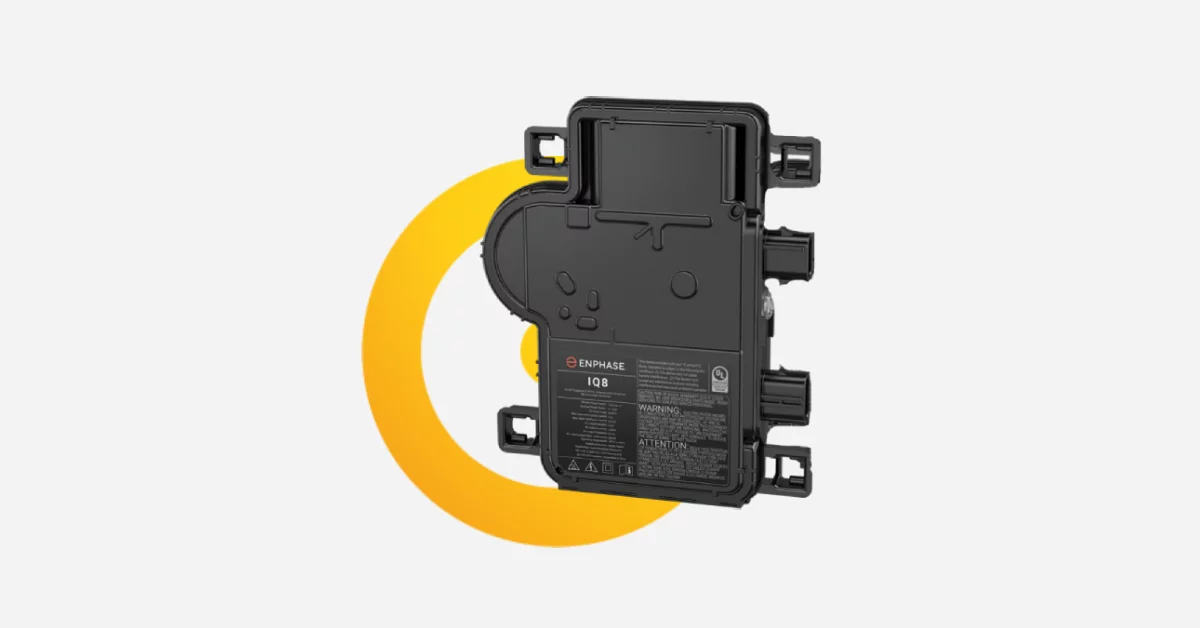
Good customer support is also crucial. It ensures that if you run into any issues or need technical assistance, you can get help quickly and easily.
A strong warranty combined with excellent support gives you peace of mind, knowing that your investment is protected and you have resources available if you need them.
Solar panel inverter: Install it by yourself or with a professional?
When it comes to installing a solar panel inverter, you might wonder if you could do it yourself.
While this might seem like a good way to save some money upfront, installing a solar inverter on your own can be risky and complicated.
Let’s talk about why hiring a professional installer is a better option:
- DIY is a Risky Endeavour: It’s not just as simple as plugging in an appliance. There’s electrical work involved. It needs to be done correctly.
- Additionally, if the inverter isn’t installed properly, it might not work efficiently, meaning you won’t get the maximum benefit from your solar panels.
- There are also local regulations and safety standards that must be followed, which can be complex if you’re not familiar with them.
- Improper installation could void warranties, damage equipment, and even cause harm to your property.
This is why it’s crucial to rely on professionals who know what they’re doing and have the right training and tools to install your inverter safely and correctly.
To avoid electrical shock and even the possibility of fires, a professional installation is a safe bet.

Why choose Soly’s professional installation?
At Soly, we believe that a professional installation is your key to a safe and successful solar energy system. We work with a network of trusted and accredited installers across the UK who are certified with HIES, TrustMark, and MCS.
How Soly’s Installation Process Works:
- Use Our Online Configurator: Start by using our online configurator to see how much you can save by switching to solar.
- Schedule a Free Consultation: Book a free consultation with one of our solar experts who can give you personalised advice based on your energy needs and home setup.
- Get a Quick Quote: After the consultation, you’ll receive a detailed quote outlining the costs and savings you can expect.
- Professional Installation: Once you’ve approved the quote and we’ve conducted a technical assessment, one of our certified and accredited installers will come to your home to install the system. Our installers are trained to the highest standards and follow all local regulations and safety codes, ensuring a smooth and safe installation process.
When you work with Soly, you can rest assured that your system is installed by experts who are dedicated to quality and safety so you can enjoy the benefits of solar energy worry-free.
FAQ
What type of solar inverter is best for solar?
The best inverter truly depends on your needs. This will include the size of your solar panel system, your roof layout, and your budget. Microinverters are perfect for roofs with shading or multiple orientations. However, string inverters are the most cost-effective for uniform setups. Hybrid inverters provide battery storage to those interested in an option with flexibility.
What are the top 5 solar inverters?
The top 5 solar inverters on the market right now include Enphase, SolarEdge, Hoymile, Tesla, and Schneider Electric.
Each of these are rated by efficiency and output power with Enphase, as a stellar microinverter having an impressive efficiency of 97-97.5%. However, all 5 of these brands offer their own features and benefits. So remember to think about your own needs and consult with a solar expert before making a decision.
How many inverters do I need per solar panel?
This depends on the type of inverter you go with. Typically, one string inverter can handle the output of an entire solar array.
But, if you choose to use microinverters, each PV panel will have its own inverter. This will give you more precise performance management and better optimisation.
How long do solar panel inverters last?
Solar panel inverters generally last between 10 to 15 years, though some high-quality models can last up to 20 years. Regular maintenance and monitoring can help them last longer.
How much do PV inverters cost?
PV inverters cost will vary. It all depends on the type and capacity. String inverters typically range from £500 to £1,000. Microinverters, hybrid inverters, and power optimisers tend to be more expensive and could cost £1,500 or more.
What can a 1000w solar inverter run?
A 1000W inverter can run small appliances like lights, fans, laptops, and small TVs. This makes it suitable for basic energy needs, but it may not support larger needs like refrigerators or washing machines.
What can a 2000 watt solar inverter run?
A 2000W solar inverter can handle larger loads, including a refrigerator, microwave, and several smaller appliances at the same time. It’s a better option for those with higher energy needs or to use in an off-grid setup.
Final thoughts: Which solar panel inverter is right for you?
Inevitably, choosing the the right solar inverter is key to getting the most out of your solar PV system.
Each component within the plays an important role. Whether it’s solar panels that capture the sun’s rays, the battery storage ensuring you have power when needed, or the solar panel mounting system providing a stable foundation. So be sure to look for an inverter that offers the right amount of efficiency, works with your PV panels, and doesn’t need much upkeep.
Regular checks and monitoring can help keep your inverter running smoothly for many years to come.
Soly: Your solar energy experts
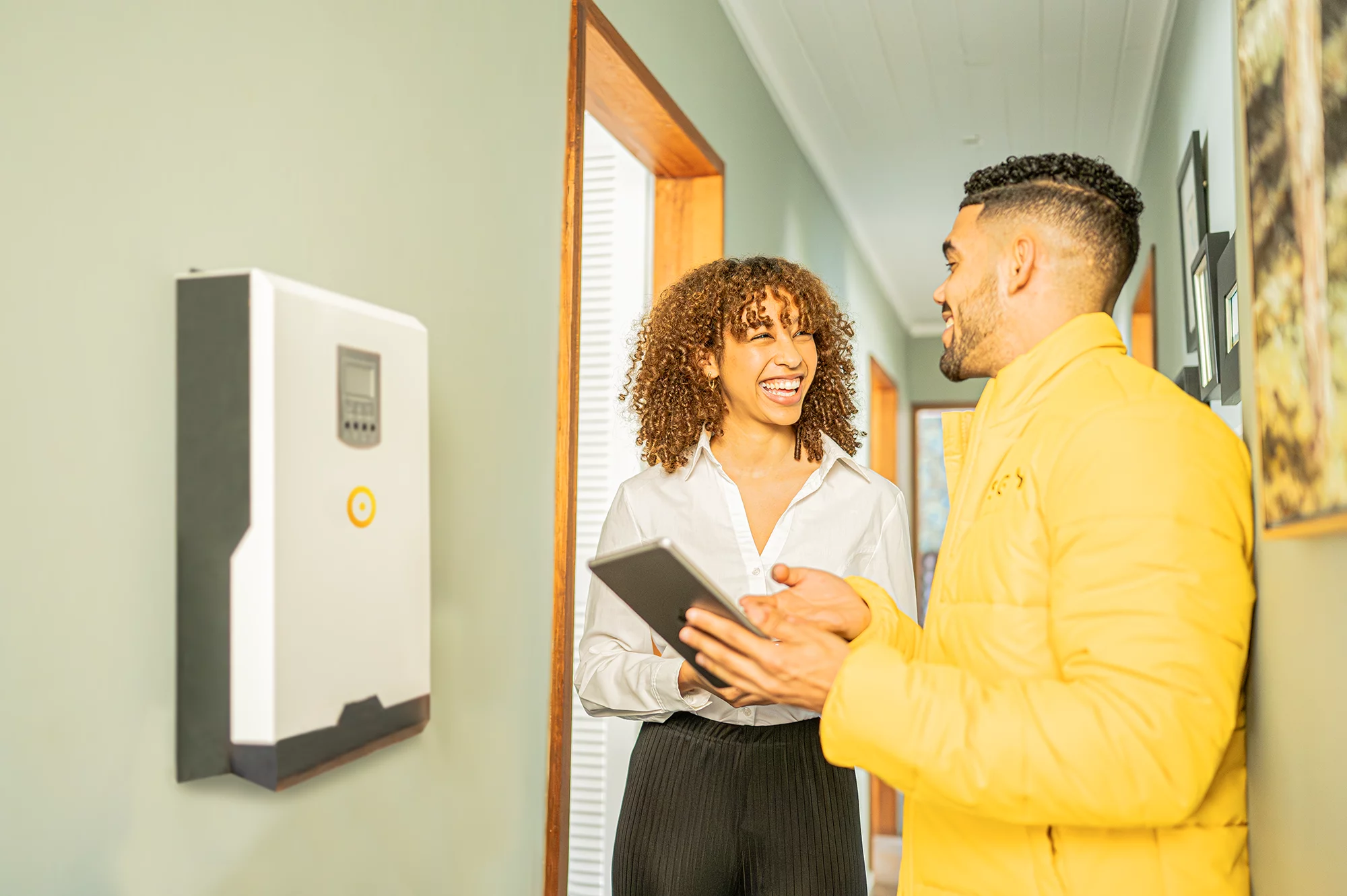
At Soly, we make solar power straightforward. Here’s why homeowners across the UK trust us for all things solar:
- We take pride in our 4.7 star rating on TrustPilot. Plus, we’re a certified Which? Trusted Trader. So you can bet that our customers’ happiness is right at the heart of all that we do.
- We only work with local installers that are accredited by HIES, TrustMark, and MCS. With installers available all across the UK, you can be confident that your installation will be safe and professional.
- We’re backed by over 10 years of experience and have more than 35,000 satisfied customers worldwide. We bring reliable expertise to every project we take on.
- Our solar panels come with guarantees of up to 25 years. Our solar batteries are backed by 15 year guarantees and our Enphase inverters as stated above, have a 25-year service guarantee. So you can rest easy knowing your investment is protected for the long haul.
Choosing Soly means choosing a trusted partner in your journey to clean, renewable energy.
Contact our solar experts so you can make the switch with confidence!